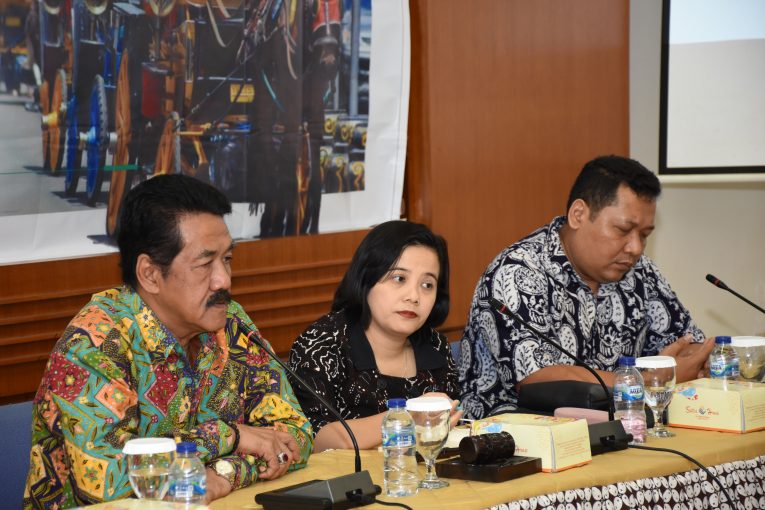
Carriage horse and coachman survive in the midst of changing times, requiring government attention for food, health, and genetic problems. The horse is the key to the existence of the carriage, a traditional means of transportation which is appointed as one of the 8 special features of the Yogyakarta Special Region.
This was revealed at the Horse and Carriage Development Workshop which was held as a series of Lustrum X activities at the Faculty of Animal Science (FAS) Universitas Gadjah Mada (UGM) in the campus on Friday (08/11). The guest speaker at the program was moderated by Ir. Tri Satya Mastuti Widi, S.Pt, MP, M.Sc, Ph.D, IPM, ASEAN. Eng, this includes Drs. H GBPH Yudaningrat, MM (Advisor of the Coachman Community in Yogyakarta), Agus Arif Nugroho, S.STP, M.Si (Head of the Yogyakarta Transportation Department), and Ir. Panjono, S.Pt, M.P, Ph.D, IPM (Laboratory of Meat, Draught and Companian Animals Laboratory). It was also invited the chairman of the Yogyakarta Coachman Community, Purwanto, and a dozen members who were mostly from the districts of Sleman and Bantul.
Dean of the FAS UGM, Prof. Dr. Ir. Ali Agus, DAA, DEA, IPU, ASEAN, Eng, when opening this event stated that FAS UGM has an interest in horses, it is proven that the campus has several horses, participated in horse racing competitions, and taught courses on horses. “This time we greet the coachman who is also the owner of the cart horse. Cart horse, not only as a means of work and iconic transportation, but also germplasm that should not become extinct,” he said.
Purwanto revealed, coachman, who on average is the owner/breeder of horses requires attention from the Livestock Department. “So far, the attention from the Department of Transportation for the management of horse carts as a means of tourism transportation is going well. In accordance with guidance, we enforce discipline so that the coachman does not allow horse droppings to fall on the road, provide bags and maintain cleanliness. If negligent, there are sanctions from the coachman community. Even horse urine on the streets we immediately flush with water and perfume,” he said.
He hoped the Livestock Department could follow the steps of the Transportation Departement, by providing assistance, especially the urgent matter was for feed problems. “Because the lands of grass food sources have decreased. If feed is increasingly difficult to obtain, then we worry that coaches will get bored with raising horses, and even later there will be no generation to continue,” Purwanto said.
Drs. H GBPH Yudaningrat, MM or Gusti Yudo conveyed, funding for the preservation and development of horses and horse carts in Yogyakarta needs to be fought to get the allocation of funds for DIY privileges, which in 2020 will reach Rp 1.5 trillion. Moreover, horse cart is a symbol of DIY privileges that must be preserved.
Gusti Yudo explained, the development of horse cattle in Yogyakarta faced a persistent problem, which was constrained by the lack of sufficient land.
Andong Horse Survey Results
Representing the Andong Horse Research Team of the FAS UGM who conducted a scientific survey to find out the actual condition of horse carriage farms in Yogyakarta, Panjono explained that there was still an assumption that hiring horses to attract horse carts was a form of slavery. In fact, as long as all aspects of animal welfare are met, there is no problem with the use of horses in horse carts.
The adequacy of aspects of animal welfare can be seen in body condition, health status, housing and behavior. As many as 96.08% of the horse carts surveyed had good body condition. However, according to Panjono, it was found 36.96% of the horses surveyed were infected with worms. “Of course this requires further management and management improvements,” he said.
Panjono explained, being a horse cart driver turned out to be the main livelihood, other jobs were side jobs. The average horse ownership is between 2-3. A valuable side income is selling horses. “We don’t need to worry about running out of the next generation of coachmen. Because 18.42% of coachmen are 21-30 years old,” he explained.
Tourist Transportation
Agus Arif Nugroho stated that horses and carriages are a unity of Yogyakarta’s transportation culture wealth, as well as a means of livelihood for coachmen. “Carriage’s existence is protected through Perda No. 5/2016 concerning traditional modes of non-motorized transportation. In fact, given the privilege to pick up and drop off passengers in the Malioboro pedestrian area,” he said.
Nevertheless, Agus Arif continued, carriage had to meet the requirements for organizing non-motorized vehicle transportation issued by the Department of Transportation. Among them are having an operational permit, having a non-motorized vehicle number sign, and the driver must have the driver’s identity.
As a tourist transportation, Gusti Yudo explained, horse carts were expected to be large, trengginas (deft), semawang (beautiful to be seen) and obedient. He gave an example, horse carriage from Padang and Manado on average better than in Yogyakarta. “Regarding history, because the VOC and the UK brought many European horses to the two cities, so their offspring remain good until now,” he said.
